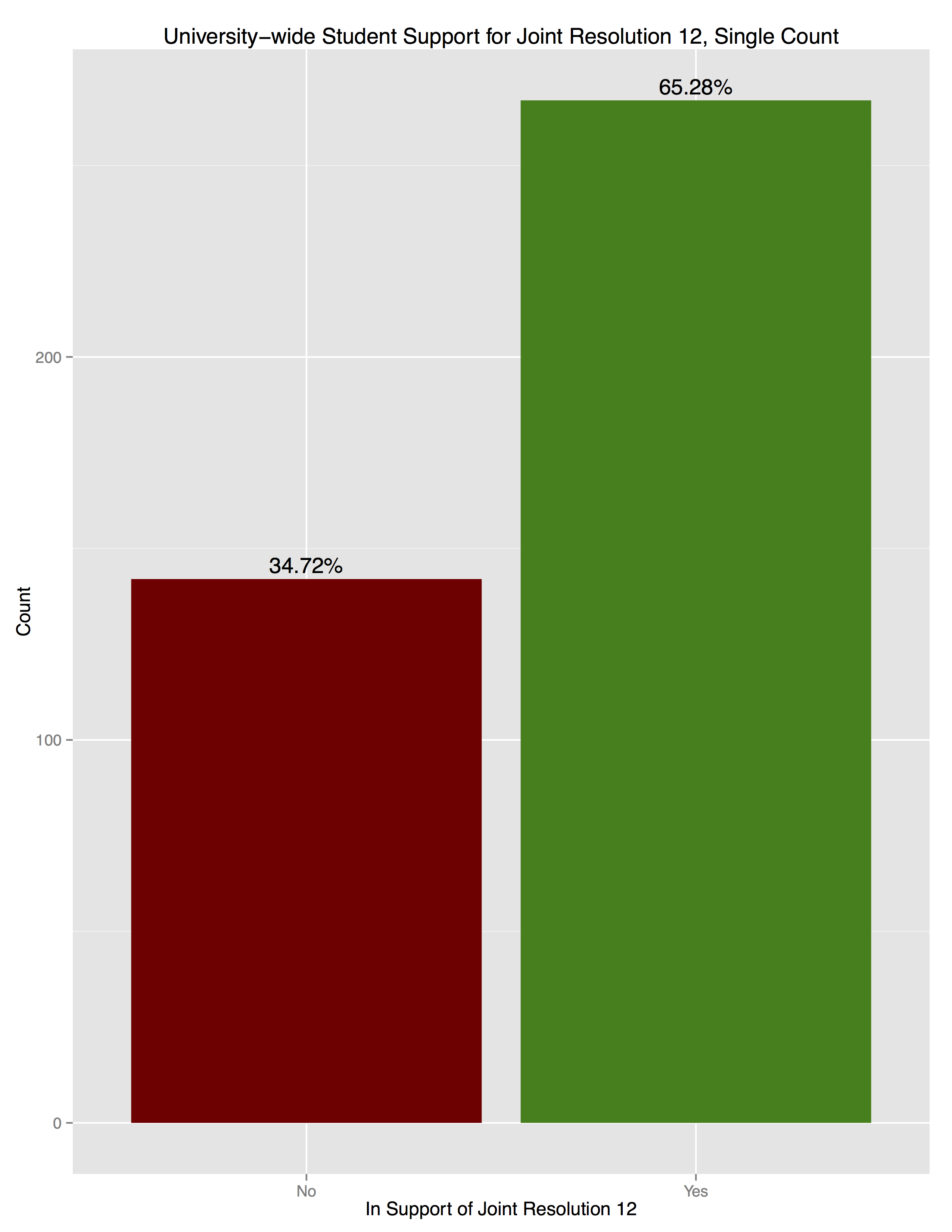Science and Activism: Stronger Together
As a twenty year-old student, I realize that global climate change, and the way that we react to it, will most likely be the defining issues of my generation. The science has already shown that climate change will cause more extreme weather conditions, resulting in the decimation of global food supplies and the endangerment of coastal communities. Predictions from the latest Intergovernmental Panel on Climate Change Report (2007) indicate that even if global atmospheric carbon dioxide concentrations were to stabilize today (meaning no net carbon dioxide produced), average global temperature would increase between 2.0 and 2.4 degrees Celsius over the pre-industrial era. This most conservative estimate does not even represent the most plausible scenario, a scenario in which average global temperatures would increase between 3.2 and 4.0 degrees. A change in temperature of this magnitude would prove devastating for agriculture worldwide. Swift, strong, and nearly unanimous action by national governments is needed to reduce the threat of global climate change to a manageable level. The scientists have done their jobs. They have researched these issues and published hundreds of academic articles displaying their findings. They continue to issue predictions, tweak projections, and dig deeper into the underlying science of climate change. Models have been created, revised, tested, and revised again. The overwhelming majority of climate scientists agree: global climate change is happening and it is mainly due to human activity.
However, many politicians have chosen to overlook these facts and ignore the science. This, in turn, has resulted in a largely apathetic response to the mounting threat of global climate change. Common citizens are beginning to realize that the science alone is not enough to convince the rulemakers to address this threat directly and to draft legislation aimed at mitigating the damage caused by changes in the global climate. It is for this reason that organizations and campaigns have formed in an attempt to force politicians and corporations to react to this threat and adjust their practices accordingly.
Over the past nine months, I have had the good fortune of being a part of one of these organizations. My good friend and roommate, Matt Kirkegaard, created a student organization called Fossil Free U at the University of Utah in late November of last year. The organization was formed in preparation for author and activist Bill McKibben’s visit to Salt Lake City as part of his “Do The Math Tour”. Largely inspired by the efforts of McKibbin’s group, 350.org, Fossil Free U aims to pressure the University of Utah to divest its endowment from the top 200 fossil fuel companies. As part of this organization, I have helped to research the issues related to climate change, collect signatures for our petition, and protest the university’s continued financial support of fossil fuel companies. At first it was difficult for me to transition from the objective, factual world of science to the opinionated, emotional world of political activism. However, I have come to find that the skill set that I have developed as a scientist is highly applicable and immensely valuable in my role as an activist.
Activism and Science: Oil and Water?
At first glance, science and activism appear to be polar opposites. Activism is based heavily on emotion. In order to get people’s attention, an issue must be able to touch a societal nerve, and issues that garner the most attention are often those that appeal to an individual’s sense of morality. A violation of a commonly held moral truth starts a movement. As people begin to band together to push for change, it becomes easy to overlook the facts that started the movement and let emotion get the best of oneself. In fact, many activists know very few of the hard facts related to their cause. How many protesters at this year’s “Forward on Climate Rally” could tell you the current concentration of atmospheric carbon dioxide off the top of their head? To these protesters, the statistics are of little value. They know that by reducing anthropogenic carbon dioxide emissions, global climate change can be slowed, but they often lack understanding of how the numbers correlate to climate change. They appreciate that by becoming a thorn in the side of the rule makers, they can help rewrite the rulebook.
Science, in contrast, is predicated upon separating emotion from reality. As Randall Munroe’s webcomic, xkcd, puts it, “The great thing about science is that it doesn’t ask for your faith, it just asks for your eyes.” The best scientists are those that are able to look past their beliefs, no matter how strongly held, to witness the reality that underlies their perception. Science is about uncovering truth regardless of what the scientist, or society, wants to hear. This very trait, the ability to look objectively at the facts, uninfluenced by emotion or belief, is what makes scientists such an invaluable resource to any movement. Scientists have plenty of experience wading through dry, methodical journal articles and extracting and assessing the accuracy of important facts, figures, and conclusions. I found this skill extremely valuable when conducting research to draft and support a student resolution proposed by Fossil Free U.
The Long Path to Change
One of the main hurdles for Fossil Free U was to build and display student support for divestment. In order to receive formal backing of the student body, we attempted to pass a student resolution calling for divestment through Utah’s student government. This resolution was broken down into three main points. First, it stated that the student body of the University of Utah recognizes that global climate change is a problem. Second, it noted that the student body realizes that the burning of fossil fuels is the major cause of global climate change. Third, it requested that the university divest its endowment from companies producing fossil fuels in an effort to drive these companies, as well as lawmakers, to adjust their path toward a carbon neutral society. Though this resolution did not directly endanger the university’s finances, we were met with strong resistance from students in a department which is heavily reliant on fossil fuel companies for the continuation of funding, student scholarships, and employment opportunities. Fortunately, the science was on our side. By researching peer-reviewed literature on climate change, we were able to help build a case for divestment that was not only morally strong, but also scientifically sound. We included facts and projections related to the present and future effects of climate change, such as the astonishing estimate that currently the effects of climate change directly or indirectly cause the deaths of 400,000 individuals annually. Ultimately our efforts paid off, resulting in the student resolution passing by majority vote in the student government Assembly.

Following our success in the Assembly, it was on to face the Senate. In order for the resolution to become an official position of the student government, it would need to pass the Senate, just as it had the Assembly. In the Senate hearing of the bill, the argument was made by the senators that we had not proven that there was enough student support for the resolution to pass. Voting was put on hold until the next meeting so that we could have time to gather and provide the necessary evidence. I recognized this as an opportunity to use another ability that I had a acquired as a scientist. Scientists are trained to analyze data and represent it in an easily understandable way. I used this skill to construct a program to plot the data from our petition to determine where our signatures originated and the rates at which we had gathered them. These visuals helped to both motivate our group and convince the student government that divestment is a trend supported by individuals from across the country and is gaining momentum. In addition, we put out a survey querying students as to their opinion of the issue. I was able to put together another program to chart overall support for our issue within the university community. Satisfyingly, individuals in favor of our resolution outnumbered those opposed three to two and the bill passed through the Senate by majority vote. However, the bill had been revised between the time of passing the Assembly and passing the Senate. In order for the resolution to pass, the changes made to the bill would need to reconciled before the Assembly. Despite several midnight attempts, we were unable to present our revised resolution to the Assembly before the end of the school year. This upcoming semester, we will once again bring our resolution before both the Assembly and the Senate in an attempt to gain official student support for the notion of divestment.

Over the past nine months, I have been repeatedly inspired by the courage of groups like Fossil Free U and 350.org to stand their ground on a position supported by science in order to change society for the better. However, I believe that these and other activist groups would benefit greatly from the heavy recruitment of individuals in the sciences. I have met many fantastic people in my work with Fossil Free U, but I have also noticed an overwhelming prevalence of training in the humanities and social sciences. I believe that scientists can stand up for the change that they believe in without sacrificing their objectivity. Science plays an integral role in the basis for many political and social issues and yet scientists remain a relatively untapped resource for these movements. I am hopeful that upon my return to Salt Lake City and to Fossil Free U later this month, I will be joined by my fellow scientists to create a more balanced, strategic, and scientifically sound approach to reach our goals. This year, when we once again bring our proposed resolution before the student government, I believe that the involvement of science-oriented students will play a significant role in determining whether or not the bill passes.
 Tyler Shimko is an undergraduate studying and conducting research in biology at the University of Utah. He has been a member of Fossil Free U since its inception in November 2012. You can follow him on Twitter @TylerShimko.
Tyler Shimko is an undergraduate studying and conducting research in biology at the University of Utah. He has been a member of Fossil Free U since its inception in November 2012. You can follow him on Twitter @TylerShimko.

[…] Science and Activism: Stronger TogetherPLoS Blogs (blog)As a twenty year-old student, I realize that global climate change, and the way that we react to it, will most likely be the defining issues of my generation. The science has already shown that climate change will cause more extreme weather conditions …Chief Science Advisor’s climate report in the newsScience Media Centre (blog) […]
[…] truth for understanding, and it’s essential as we attempt to make our science understandable by laypeople, politicians, businesses, and even other […]